| Srl | Item |
| 1 |
ID:
178030
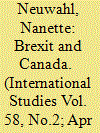

|
|
|
|
|
| Summary/Abstract |
This article investigates how Canada’s trade with the EU-27 and the UK might be affected by Brexit. As the transition period foreseen in the 2019 UK Withdrawal Agreement has ended, the EU and the UK are no longer one customs area. The EU–Canada Comprehensive Economic and Trade Agreement (CETA), like other EU agreements, has ceased to apply to the UK. Henceforth, the policies and legislation of the UK and the EU-27 will invariably diverge. Taking into account both the EU–UK Trade and Cooperation Agreement as well as the Canada UK Trade Continuity Agreement concluded in late-2020, the article shows that the agreements reached, while providing immediate stopgaps for some of the fallout of Brexit, also represent potential for a new departure.
|
|
|
|
|
|
|
|
|
|
|
|
|
|
|
|
| 2 |
ID:
178031
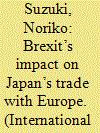

|
|
|
|
|
| Summary/Abstract |
In the context of globalization, the Japanese government emphasizes the importance of reinforcing the free trade system. Due to European Union’s (EU) reluctance, the free trade agreement (FTA) negotiations between Japan and the EU took 4 years to conclude. However, Brexit prompted the conclusion of Economic Partnership Agreement (EPA) with the EU as to maintain the economic interests of both sides after the British exit from the EU. The UK wants to maintain economic relations with Japan and to become a ‘Global Britain’ in the post-Brexit era. This article analyses both Japan–EU and Japan–UK FTAs. The core of the article looks at the impact of Brexit on Japan’s access to the European single market through a review of Japanese sectors and large corporations, particularly the automobile industry.
|
|
|
|
|
|
|
|
|
|
|
|
|
|
|
|
| 3 |
ID:
178028
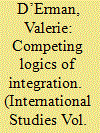

|
|
|
|
|
| Summary/Abstract |
The European Union’s (EU) external trade policy has long been championed by scholars and practitioners alike as one of the great accomplishments for European integration. The UK’s exit from the EU in 2020 offers many precedents; one of which is the current negotiation of a trade deal between the EU and a former important member of the single market. This paper outlines the trade negotiation process between the EU and the UK and the resulting Trade and Cooperation Agreement (TCA) against the backdrop of the COVID-19 pandemic to forecast the broader potential evolution of EU trade policy. The increasing visibility of nationalist and protectionist statements in various instances of political communication suggests a major shift in multilateral norms away from the liberal-international emphasis on heightened trade and interdependence. The implications for the EU external trade policy are a re-direction of efforts toward internal single market cohesion, and a more cautious approach to future potential trade agreements.
|
|
|
|
|
|
|
|
|
|
|
|
|
|
|
|
| 4 |
ID:
178026
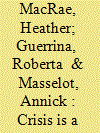

|
|
|
|
|
| Summary/Abstract |
As critics are quick to point out, the European Union (EU) has entered the crisis phase of its evolution. It could be argued that crisis management is now the EU’s new normal. Dealing with both endogenous (e.g., economic crisis and Brexit) and exogenous crises (e.g., the migrant crisis and COVID-19), the EU is facing a whole new set of challenges that has the potential to destabilize the complex institutional balance that has maintained the process of European integration over the last 70 years. In this environment of rapid responses, gender+ equality has frequently been compromised. As we argue in this article, the implications of this backsliding are grave not only for equality but also for the European Union as a whole. Drawing on Walby’s concept of gender regimes and social transformation, we consider current crises and the EU’s responses to those crises to highlight potentially dangerous shifts in the European gender regime. With crisis response increasingly supporting a neo-liberal gender regime, the current state of perpetual crisis in the European institutions does not bode well for the future of equality.
|
|
|
|
|
|
|
|
|
|
|
|
|
|
|
|
| 5 |
ID:
178025
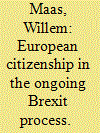

|
|
|
|
|
| Summary/Abstract |
Although traumatic, the ongoing Brexit process does not fundamentally alter either the legal status of European citizenship or the debates about it within the European Union (EU). Citizenship and free movement are so fundamental to the European project that even the new status of an important state like the UK does not change the political dynamics surrounding them.
|
|
|
|
|
|
|
|
|
|
|
|
|
|
|
|
| 6 |
ID:
178029


|
|
|
|
|
| Summary/Abstract |
India and the European Union (EU) are strategic partners with strong trade ties. Similarly, India has historical ties with the UK. Within the EU, the UK used to be an important export market and investment destination for India. There is also a large Indian diaspora in the UK. The article looks at the post-Brexit impact on India’s economic and political ties with the EU. It also evaluates evolving India–UK ties in a post-Brexit scenario.
|
|
|
|
|
|
|
|
|
|
|
|
|
|
|
|
| 7 |
ID:
178027
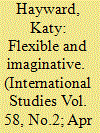

|
|
|
|
|
| Summary/Abstract |
The 1998 Good Friday (Belfast) Agreement that cemented the peace process formalized Northern Ireland’s position as a region integrally connected to both Great Britain and the Republic of Ireland. The multilevel governance and cross-border cooperation this entailed was enabled by common UK and Irish membership of the European Union. The UK’s decision to leave the EU posed risks to this settlement. In response, they engaged in a quest for ‘flexible and imaginative solutions’ to this conundrum. The unique arrangements established through the Protocol on Ireland/Northern Ireland in the UK–EU Withdrawal Agreement (2019) mark an innovative and ambitious development for the EU. First, it de facto includes a region of a non-member state within its internal market for goods and, second, it delegates the enforcement of its rules to that non-member state. The Protocol represents a significant departure for the EU in terms of its typical engagement with external actors. Most significantly, it will not only represent a ‘live’ concern for the EU but a unique type of responsibility.
|
|
|
|
|
|
|
|
|
|
|
|
|
|
|
|
| 8 |
ID:
178024


|
|
|
|
|
| Summary/Abstract |
This article focuses on the governance of migration and borders as key issues of Brexit in a dual sense: as a contested political issue centrally fueling the Brexit debates and as an area of policy formation. First, the article addresses how Brexit has changed free movement as a key principle of the European integration project and transformed cross-border mobility between the European Union (EU) and the UK in a post-Brexit European border regime. Second, it discusses how the politicization of migration during the Brexit campaign has accentuated competing visions of political community. With a view to the effects of Brexit on the governance of migration and borders in Europe, the article demonstrates how the Brexit debates have emphasized the prominence of exclusionary nationalism, while they have simultaneously created new opportunities for the EU to launch a major reform of its migration and asylum policies.
|
|
|
|
|
|
|
|
|
|
|
|
|
|
|
|